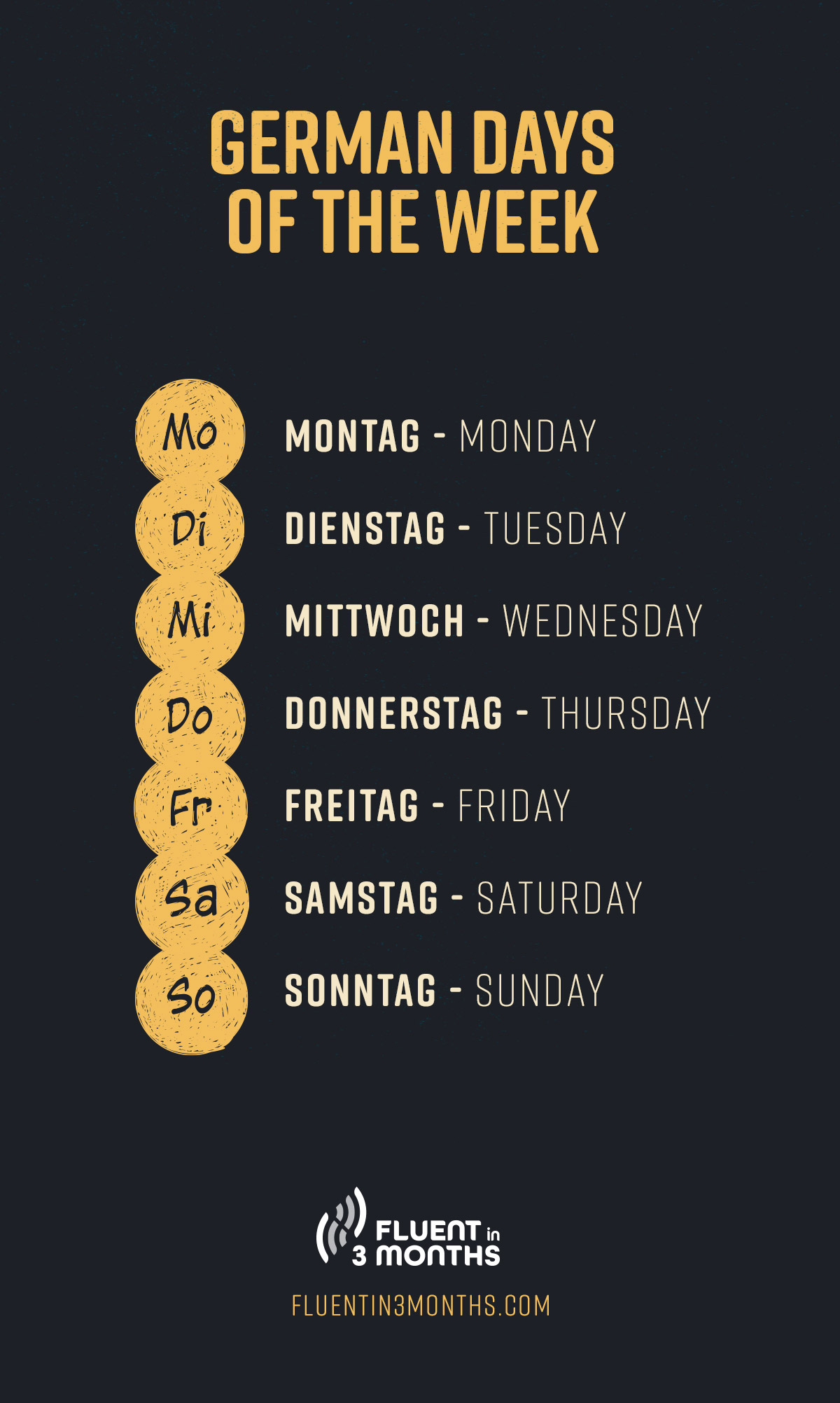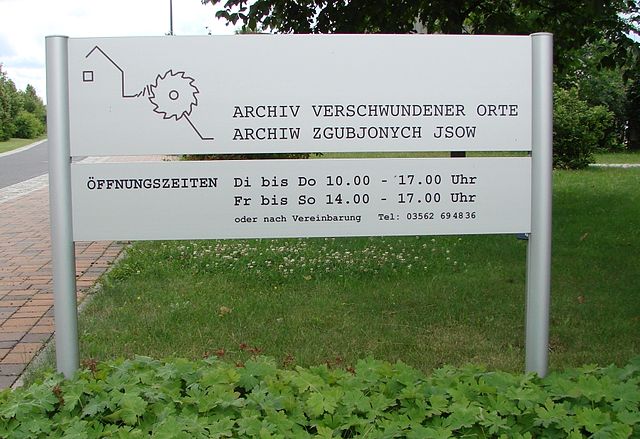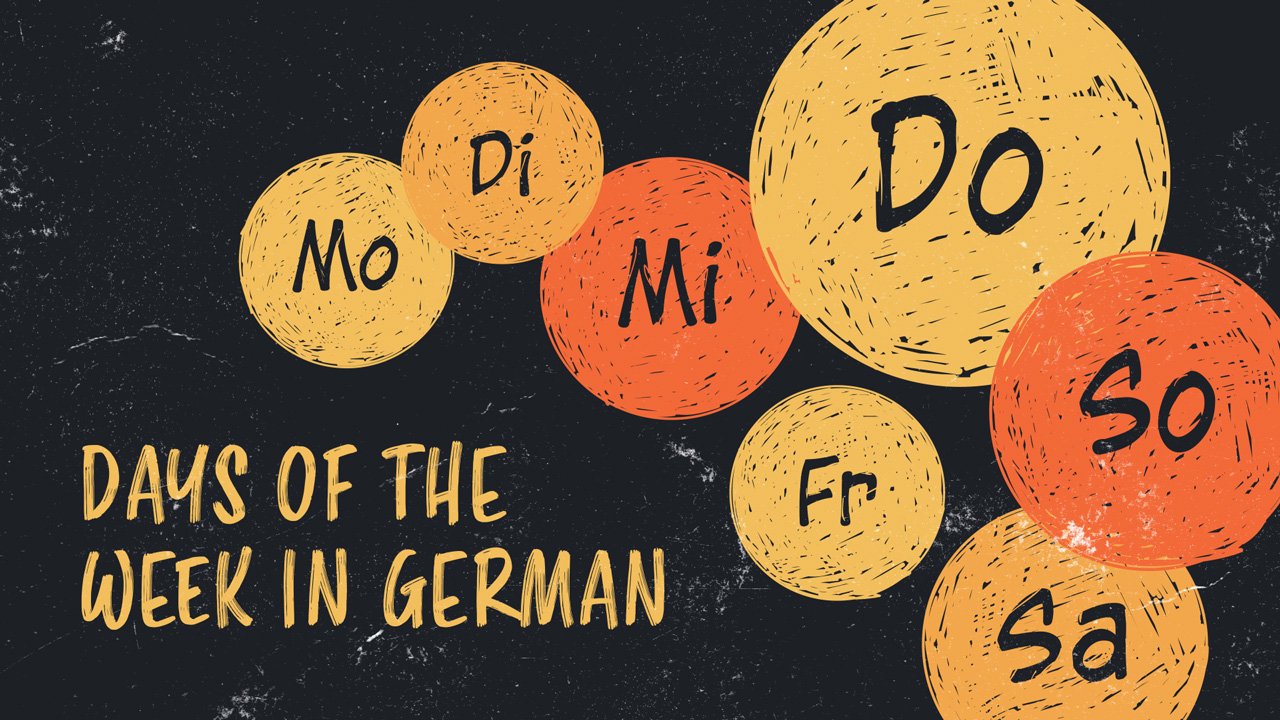Days of the Week in German & Easy Ways to Remember Them
Guten Tag! “Tag” in German means “day” – but what day is it? How do you talk about the days of the week in German?
| German Days of the Week | |
|---|---|
| Monday | Montag |
| Tuesday | Dienstag |
| Wednesday | Mittwoch |
| Thursday | Donnerstag |
| Friday | Freitag |
| Saturday | Samstag |
| Sunday | Sonntag |
Learning German is easy if you approach it the right way, and the German days of the week are easy to learn too. Most of them are similar to the English ones, and the rest aren't too hard to memorize.
Below, I'll tell you everything you need to know about the days of the week in German. I'll cover what they are, where they come from, and how to use them. On top of that, I'll give you some tips and tricks for how to remember them.
Table of contents
- German Days of the Week
- How to Say “Yesterday”, “Today” and “Tomorrow” in German
- What Gender are the German Days of the Week?
- How to Ask “What Day of the Week is it?” in German
- How to say “On Monday”, “On Tuesday”, etc. in German
- When to Capitalise Days of the Week in German
- How to Say “From Monday to Friday” in German
- Abbreviations for German Days of the Week
- How To Remember the German Days of the Week
German Days of the Week
“Monday” in German: Montag
“Monday” in German is Montag.
The name comes from Mond, the German word for “moon”. So “Montag” is literally “moon-day”. In fact, that's where the English word “Monday” comes from too.
Fun fact: in German-speaking countries, Montag is considered to be the first day of the week (as opposed to some places where Sunday is considered the first).
“Tuesday” in German: Dienstag
“Tuesday” in German is Dienstag.
The origins of this name are thought to go back to the old Germanic god Týr. Týr was a god of law and heroic glory. Dienstag is “Týr's day”.
You guessed it, that’s also where we get “Tuesday” from.
“Wednesday” in German: Mittwoch
“Wednesday” in German is Mittwoch. It's the only day whose name doesn't end in “Tag”. The name simply means “Midweek”.
“Thursday” in German: Donnerstag
“Thursday” in German is Donnerstag. Donner is the German word for “thunder” – so Donnerstag means “thunder's day”.
The day was originally named after Thor. You know, the Norse hammer-wielding god who was later transformed into a Marvel comic superhero.
In German-speaking cultures, the Norse god Thor is known as Donar.

“Friday” in German: Freitag
“Friday” in German is Freitag. You can spot the obvious connection between the English and German words.
In both languages the name comes from the god Frige (sometimes spelled “Frig”).
“Saturday” in German: Samstag
“Saturday” in German is Samstag, or alternatively Sonnabend (“Sun-evening”).
The latter is only heard in northern and western Germany, and never in Austria or Switzerland. Samstag is more universally understood.
Samstag comes from the Greek sambaton. Sambaton in turn comes from an older Greek word sabbaton, which is related to the word “Sabbath”. It has similar roots to the French samedi and the Spanish sábado.
“Sunday” in German: Sonntag
“Sunday” in German is Sonntag. It comes from Sonne, which is the German word for “sun”. So Sonntag is literally “Sun-day”.
Hmmm… can you guess where the English word might have come from?
How to Say “Yesterday”, “Today” and “Tomorrow” in German
If we're going to talk about days in German, there are some other things you should know, like Gestern, heute, and morgen mean “yesterday”, “today”, and “tomorrow” respectively.
Morgen can also mean “morning”, which can get slightly confusing.
It's usually obvious from the context whether morgen means “tomorrow” or “morning”.
If someone says dieser Morgen, you'll know they mean “this morning”, because “this tomorrow” doesn't make sense. If you want to say “tomorrow (in the) morning”, say morgen früh – “tomorrow early”.
What about the days before gestern and after morgen? In English we say “the day before yesterday” and “the day after tomorrow”, but German has special words: vorgestern and übermorgen respectively.
So “ich werde es übermorgen tun” means “I'll do it the day after tomorrow”.
Finally, you should know how to say “week” and “weekend” in German. They're Woche and Wochenende respectively. If you do something “at the weekend”, you say an der Wochenende.
What Gender are the German Days of the Week?

What gender are German days of the week? Easy: all German days of the week are masculine.
Remember that the word Tag is masculine, so according to the rules of German compound words, a word like Sonntag must be masculine too.
Mittwoch is an exception, but don’t panic. It’s masculine too (despite the fact that Woche, “week”, is feminine).
How to Ask “What Day of the Week is it?” in German
I’ve already mentioned that welchen Wochentag haben wir heute? means “what day of the week is it?” But this isn't the only way to ask this question.
Here are three other ways you might hear it:
- Welchen Tag haben wir heute? – “Which day do we have today?”
- Welcher Tag ist heute? – “Which day is today?”
- Was ist denn heute für ein Tag? – “What is today for a day?”
There’s one problem with the phrasing in these questions: it's not clear whether you're asking for the day of the week or the date. Using Wochentag (day of the week) rather than Tag, as in my very first example, clears up this problem.
To ask for the date, use Datum:
- Welches Datum haben wir heute? – “What date do we have today?”
- Was ist das aktuelle Datum? – “What is the current date?”
How to say “On Monday”, “On Tuesday”, etc. in German
In English, we say “on Monday”. In German, you say “am Montag” – literally, “on the Monday”.
The word am is a combination of an (“in/on”) and dem (dative masculine form of “the”).
So, for example, “I ate meat on Tuesday” is “ich habe am Dienstag Fleisch geessen“.
Relate Learning: German Articles – Everything You Need to Know
When to Capitalise Days of the Week in German
As you may know, nouns in German are always capitalised. But does a word like “Mittwoch” count as a noun?
In general, yes: days of the week function like nouns and therefore must be capitalised. But there's one exception: to say you do something habitually on a given day of the week – e.g. “I do it on Mondays” – then the day is not written with a capital letter.
To go back to the meat-eating example: “I eat meat on Tuesdays” is ich esse dienstags Fleisch (Note the “s” on the end of dienstags).
How to Say “From Monday to Friday” in German
To say “from (day) to (day)”, use von… bis.
“From Monday to Wednesday, I study German” would be Von Montag bis Mittwoch, studiere ich Deutsch.
Abbreviations for German Days of the Week
In English, we often write “Mon”, “Tue”, “Wed”, and so on when we don't want to write the full name of the day.
In German, they do something similar, but they generally abbreviate days to their first two letters rather than three. You can see it on this sign:

How To Remember the German Days of the Week
Hopefully, the days of the week won't take you long to learn. There's only seven of them, and they're not that different from English! But if needed, here are some tricks to help you memorize them.
First of all, make sure you're exposed to the days of the week as much as possible, so you're constantly reading them and being reminded of them.
One good way to do this is to change the settings of your phone and computer to German. Now, when you look at the calendar app on your phone, you'll be reminded of the relevant vocabulary.
If you use a paper calendar, buy a German one too! Look for as many ways as possible to increase the amount of German you hear and read.
You could try memorizing the days in the form of a song. Here's one simple song that should help you learn. Here's another one that's aimed at German children. There are many more on YouTube if those two aren’t to your liking!
Mnemonic Tricks to Learn the Name of German Days – Funny (But Effective!)
Finally, you can use mnemonic tricks to burn each day of the week into your brain. The basic formula goes like this:
For each day, think of an image that reminds you of how its German name sounds.
For example, for Dienstag you could think of the actor James Dean riding a stag.

For Mittwoch, think of Mitt Romney cooking food in a wok. Or you could picture yourself eating a Döner kebab for Donnerstag.
Next, think of something that you associate with a particular day of the week.
For Sunday, it could be a church (even if you don't go to church yourself). For Monday, it could be your alarm clock waking you up for work. Tuesday could be the day for an American presidential election (they’re always held on a Tuesday).
You get the idea.
Use personal connections if possible: if you have salsa lessons every Thursday evening, then your mnemonic for Thursday could be an image of yourself dancing at your salsa class.
Finally, create an image in your head that joins together the images you came up with.
For example, for Thursday (Donnerstag) picture yourself dancing salsa while eating a Döner kebab. When it comes to Sunday (Sonntag), imagine yourself attending church under the sweltering hot sun.
If that sounds unlikely, wait until you picture this one: being woken up by your alarm while sleeping on the surface of the moon on Monday (Montag). For Tuesday (Dienstag) think of James Dean riding a stag while campaigning for president.
Don't be shy – the more outlandish and ridiculous the image, the more likely you are to remember it! Similarly, make it as vivid and colourful as possible. What does the scene smell like, sound like, and taste like? What emotions does it make you feel?
Create a good mnemonic, and you'll only have to think about this once – then it will be burned into your memory forever. As they say in German – einfach (“simple”)!




Social